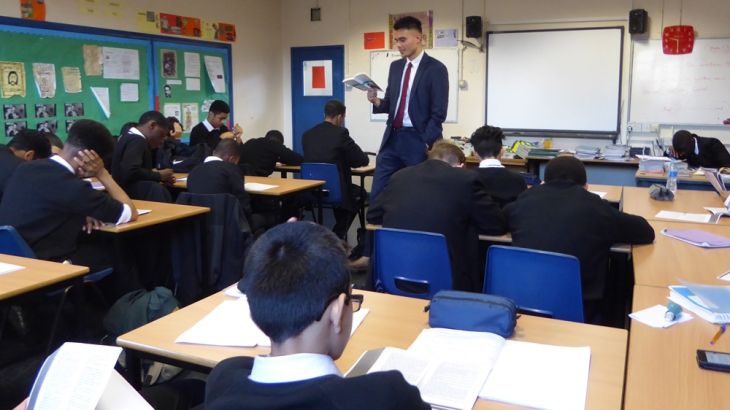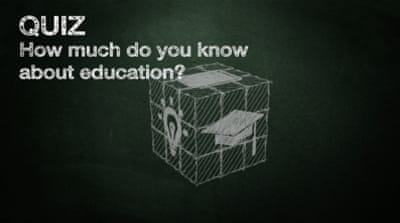
Pick Your Teacher: Democratic Schooling in the UK
How allowing students at a London inner-city school to choose their curriculum and teachers is improving results.
The London Nautical School was founded in 1915 to train students in maritime skills. Today it’s a modern, non-selective inner London state school for boys – with a very different approach to learning.
At the start of the year, teachers pitch their courses to the students, who are given the power to choose what courses they want to study. This forces staff, students and parents to work closely together to evolve the content of the courses on offer. And it has created radically different courses, which are highly engaging and are placing students at the centre of the learning experience.
Keep reading
list of 4 itemsColumbia University leaders face scrutiny over anti-Semitism on campus
Top USC graduate cancelled over Gaza speaks out
Columbia president faces anti-Semitism Congress hearing: What’s at stake?
We had to prove ourselves before we would be taken seriously, and I do think that if you're going to create change in the way that we have, in a system like this, you have to have the courage to be willing to fail or to be seen to fail by others.
“We are the only school that I know of that chooses its own English teacher. I think in a way it matures you … and it makes your self-esteem go up,” one student says.
This fresh approach to learning started in the school’s English department. They wanted to push the British education system as far as they could – a system that is often perceived as prescriptive and restrictive for teachers.
“When I first came to the UK, one thing that did strike me was the amount to which the system for education focuses on exam outcomes. There is a lot of punishment associated with doing badly in exams, it seems. It’s often led to really conservative approaches in the classrooms and schools … I think there is much more that we should be doing in classrooms than simply getting ready for exams,” says Chris Waugh, head of the English department.
When their ideas were first introduced into the school, they were considered controversial.
“This has not been easy. Within a state school institution, people dislike change … and, within the school, I have had to battle with people in order to get them to agree for us to go ahead with these programmes and processes … Giving students and parents the choice is terrifying for a lot of people in education,” says Waugh.
But the English department’s approach has proven so successful that it’s being rolled out to other departments and is currently in different states of implementation in subjects across the school.
It has also attracted interest across the UK, so some of the teachers and students travel around the country to present their ideas to other schools and at educational conferences.
“We had to prove ourselves before we would be taken seriously, and I do think that if you’re going to create change in the way that we have, in a system like this, you have to have the courage to be willing to fail, or to be seen to fail by others,” Waugh explains.
In this film, we follow some of the teachers putting together their syllabus for the year and students choosing their preferred course. We also talk to teachers, students and parents about the pedagogy in practice: What happens to the teachers if no students choose their course? And how has this approach affected the school’s exam results?
FILMMAKER’S VIEW
By Tim Froggatt
In the British education system, there’s a huge emphasis on what is called “setting”, which divides children into classes or “sets” based on how good they’re judged to be at a subject. So in a particular school subject, we’ll end up with a top set containing the “cleverest” children and a bottom set along with a whole hierarchy of sets ranked in between.

It’s a popular idea that appeals to school leaders, parents and politicians. The theory is that it allows teachers to tailor their lessons to the abilities of the students in front of them. Top-set students can be moved on to the difficult material to stretch and challenge them, whereas struggling students can spend more time getting the basics in place.
At the London Nautical School, they’ve taken the bold step of rejecting “setting” in both English and Science lessons, choosing a moral stand over populism.
Some experts claim that setting can enable those at the top end of the scale to perform better, but Head of English Chris Waugh doesn’t believe this. And moreover, he’s concerned about the cost to the success (and the self-esteem) of those in the middle and lower sets. Often they never catch up, condemned to that low expectation of achievement for their entire school career. In many cases, they’re never given the opportunity to catch up because they’re not even exposed to all of the subject material.
The idea of setting seems very alien to many of the teachers I’ve met from places such as Budapest or Shanghai, where students are taught in mixed groups and all given the same opportunities.
Waugh explained to me that he bans his department from using the terms “high ability” and “low ability”. He can’t bear the thought that teachers label students in that way. As the English department proclaim, “everyone can achieve” in every class. There’s no sense that one class is for clever students and another for those who struggle.
It seemed to me from my brief time spent filming in the classrooms, that all the students were benefiting from the experience of being educated together. And indeed, they do get great results in every class.
![At the London Nautical School they are re-imagining the role of teachers giving students the power to choose for themselves what courses they study [Al Jazeera]](/wp-content/uploads/2016/12/554ef98a956c48ce9a6e6b83d2cd9380_18.jpeg)
One of the fascinating things that the school introduced is a system of online “badges”. These represent a large array of achievements that the students should be attempting, for example analysing a poem (in English) or processing data (in Science). If they succeed in one of these tasks, they achieve a virtual badge which is recorded online.
If they don’t reach the required standard, they’re not branded a failure. They’re simply told how they need to improve their work and they’re free to keep trying as many times as they like. In this system, students don’t get labelled as “A-grade” students or written off as “F-grade” students. Anyone can always try for another badge, and they can keep trying until they get it. It’s a system in which it really is possible for everyone to achieve.
The London Nautical School is, like the majority of UK state schools, a comprehensive school – a school that teaches all students, regardless of their prior academic achievement.
It was ironic that just as Chris Waugh was telling all the students how high achievement was possible for everyone, the UK government announced plans to expand the number of grammar schools in the country. These are state-funded schools which, unlike comprehensive schools, select the students they accept based on the results of academic tests.
Previously, it was not possible to open new selective schools, although a number of grammar schools still exist – relics from the 1950s and 60s when the nation’s education system was more segregated.
This is perhaps the ultimate example of setting – where at the age of 11, children sit a test to determine whether they’re deemed academically good enough to be allowed into a grammar school.
Waugh told me about his anger at the thought of reviving this system, a legacy of the UK’s social-class elitism where certain children are given academic privilege, but at what cost to everyone else?
In his teaching, Waugh makes a point of exploring the country’s social inequality, encouraging the young people to challenge the society they’re being brought up in.
This broad outlook is an integral part of his lessons. He has high expectations of his students and while I was there, he told them with complete conviction that he expected at least one of them should become a prime minister in the future.
When one of those boys from the London Nautical School does grow up and find himself in a position of power, I’m sure his outlook will be influenced by the radical education he received from the London Nautical School’s English and Science departments.